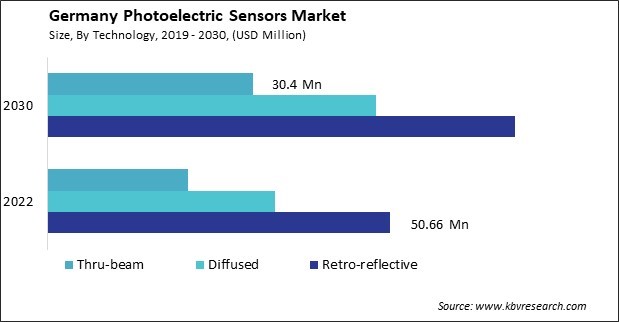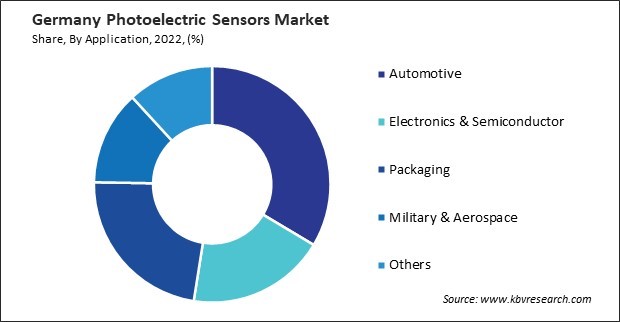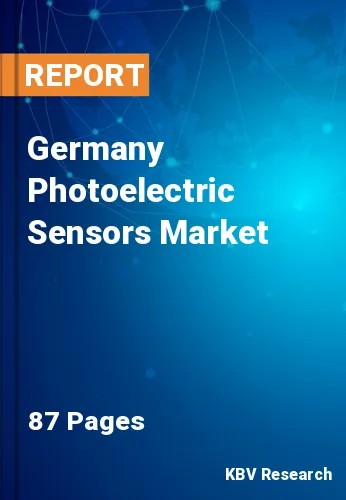The Global Photoelectric Sensors Market size is expected to reach $148.22 million by 2030, rising at a market growth of 4.5% CAGR during the forecast period. In the year 2022, the market attained a volume of 2,082.36 thousand units, experiencing a growth of 4.6% (2019-2022).
The photoelectric sensors market in Germany has witnessed significant growth and innovation, driven by the country's robust industrial sector and commitment to technological advancements. Photoelectric sensors play a key role in automation and control systems, enabling precise and reliable detection of objects, distances, and colors. As Germany continues to be a global leader in manufacturing and Industry 4.0 initiatives, the demand for advanced sensing technologies like photoelectric sensors is rising.

The stringent safety standards in the German industries also drive the adoption of photoelectric sensors for personnel and equipment protection. These sensors are employed in safety systems to detect the presence of personnel in hazardous areas, ensuring compliance with occupational safety regulations. The reliability and responsiveness of the photoelectric sensors make them integral components in ensuring a safe working environment across various industrial sectors.
As the photoelectric sensors market in Germany continues to grow, there is a parallel focus on research and development to introduce innovative sensor technologies. Miniaturization, increased sensing range, and the integration of artificial intelligence are some trends shaping the evolution of photoelectric sensors. German sensor manufacturers are actively investing in R&D to stay at the forefront of technological advancements and cater to the evolving needs of industries.
Germany's robotics and automation (R&A) industry has been a key driver for adopting photoelectric sensors, contributing to the nation's leadership in advanced manufacturing. German manufacturers in sectors such as automotive, machinery, and electronics heavily rely on these sensors for their precision, reliability, and versatility in diverse applications. Companies within this sector continually invest in research and development to deploy state-of-the-art sensor solutions, further solidifying the role of photoelectric sensors as integral components in Germany's advanced and interconnected manufacturing landscape.
According to the Germany Trade and Invest, Germany's robotics and automation (R&A) industry has enjoyed unprecedented success over the last decade, almost doubling turnover from 2010 to 2019. The first signs of post-coronavirus recovery are being felt, with the sector forecasting a turnover of EUR 13.4 billion in 2021. The robotics and automation (R&A) sector in Germany have generated a turnover of EUR 13.4 billion in 2021, according to the VDMA Robotics + Automation Association. As the R&A industry in Germany continues to grow, the demand for advanced sensor technologies, including photoelectric sensors, is likely to escalate, further driving innovation in this sector.
The demand for logistics and warehousing in the photoelectric sensors market in Germany has experienced a significant upswing, driven by the nation's robust manufacturing industry and increasing adoption of automation technologies. Photoelectric sensors are crucial in industrial automation, providing reliable detection and measurement capabilities. The need for adequate logistics and warehousing infrastructure has intensified as German industries continue to integrate these sensors into their processes for enhanced efficiency and precision.
In response to the growing demand, logistics and warehousing providers in Germany are strategically expanding their capabilities to accommodate the storage, transportation, and distribution of photoelectric sensors. The emphasis is on increasing storage capacity and optimizing supply chain processes to ensure timely and secure delivery. This surge in demand reflects the broader trend of Industry 4.0 adoption in Germany, where smart manufacturing and automation technologies are reshaping traditional production methods. The logistics and warehousing sector's adaptability to support the evolving needs of the photoelectric sensors market positions Germany as a key player in the global industrial automation landscape. Therefore, as Industry 4.0 advances, the logistics and warehousing sector's ability to efficiently handle photoelectric sensors contributes significantly to Germany's position as a leader in industrial automation.
The automotive industry has been a significant driver of the photoelectric sensors market in Germany, experiencing a notable rise in recent years. With Germany being a global automotive powerhouse, the demand for photoelectric sensors has surged as automakers integrate advanced sensing technologies into their manufacturing processes. Photoelectric sensors play a crucial role in automotive applications, contributing to enhanced production line automation, precision, and safety. These sensors are utilized for object detection, quality control, and positioning, ensuring efficient and error-free assembly processes.
The rise in the industry in Germany has created a ripple effect across the photoelectric sensors market, leading to increased investments in research and development. As automakers strive to achieve higher levels of automation and adopt Industry 4.0 principles, the demand for innovative sensor solutions has intensified. Photoelectric sensors contribute to the optimization of production workflows, reducing downtime and improving overall efficiency. Furthermore, emphasizing electric vehicles and integrating smart technologies in modern vehicles further propels the demand for advanced sensing solutions.
According to the Germany Trade and Invest, Germany's automotive industry recorded a total revenue volume of EUR 410.9 billion in 2021 –equivalent to an eight percent increase in 2020 revenue. The domestic market accounted for over EUR 136.9 billion, with more than EUR 274 billion in turnover generated in foreign markets. Therefore, the burgeoning automotive sector in Germany continues to fuel the growth of the photoelectric sensors market, driving technological advancements and widespread adoption across the industry.

Germany is a key player in industrial automation, and several companies have contributed to the photoelectric sensors market. Based in Essen, Germany, ifm electronic GmbH is a well-known manufacturer of sensors and control systems for industrial automation. The company's product portfolio includes a variety of sensors, among them photoelectric sensors. These sensors are designed to meet the demands of modern industrial processes, contributing to increased efficiency and productivity.
Leuze electronic, headquartered in Owen, Germany, specializes in optoelectronic sensors and solutions for factory automation. The company's product range includes photoelectric sensors designed to enhance the performance of industrial processes. Similarly, Elobau, based in Leutkirch im Allgäu, Germany, manufactures sensors and control systems. The company's product range includes photoelectric sensors in object detection and distance measurement applications. Elobau's sensors find application in automotive, agriculture, and industrial automation industries.
Wenglor Sensoric is a company specializing in innovative sensor technologies. The company offers various sensors in automation and control systems across various industries, including photoelectric sensors. Wenglor's sensors are designed to meet the demands of modern industrial processes.
These local companies exemplify the strength and innovation present in Germany's photoelectric sensors market. Their contributions to industrial automation, precision manufacturing, and safety applications highlight the importance of local expertise in shaping the landscape of the photoelectric sensors market in Germany.
By Technology
By Application
Our team of dedicated experts can provide you with attractive expansion opportunities for your business.

